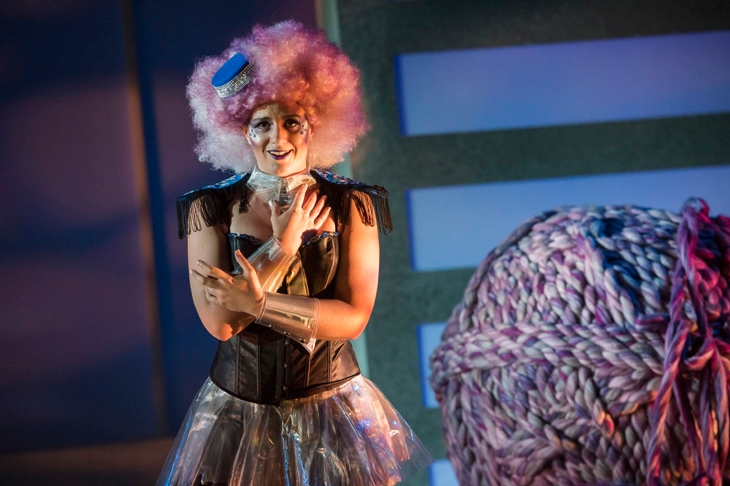‘They’ve dined well, they’ve drunk their fill, their brains are dull and slow. They’ll sit snoozing in the dark until they hear some applause, and then, out of courtesy, they’ll wake up’. Hugo von Hofmannsthal’s words, not mine. I’ve never bought the notion that Strauss and Hofmannsthal’s Der Rosenkavalier somehow predicts the first world war. But what’s screamingly obvious is that their next collaboration, Ariadne auf Naxos, precisely skewers the non-existent (in 1916) world of English country-house opera. A millionaire patron has hired an opera company and a comedy troupe for an evening of champagne-fuelled hospitality, and he wants them both finished in time for the fireworks. Strauss and Hofmannsthal’s big idea is to collide the two artistic worlds, live on stage, and see which wins.
It’s a meta-opera, in other words, and it’s a rare staging that — in the backstage Prologue, at least — can resist updating the action to the present. Opera Holland Park’s Ariadne is a co-production with Scottish Opera and it’s arrived in Notting Hill with cast and concept almost unchanged. In Glasgow, the set was dominated by a Jacobean façade which (it’s now obvious) was Holland House, the backdrop for all of OHP’s productions. Yet the Scottish jokes remain, from the kilt-wearing, arse-flashing comedian to — gloriously — the presence of Eleanor Bron, magisterial in designer wellies as the Major Domo. They’ve kept the same conductor — Brad Cohen, finding an even more persuasive blend of wit and grandeur — and retained director Antony McDonald’s conceit of making the trouser-role of the Composer (Julia Sporsén) into a nervy bluestocking, whose encounter with the burlesque queen Zerbinetta (Jennifer France) becomes a moment of sensual awakening. Sporsén’s Composer seemed less brittle and more feisty than in Glasgow, but no less touching for it.
In the pocket-sized opera house at Longborough, meanwhile, they hardly needed to point out the parallels — not when the company’s irrepressible owner Martin Graham proved as willing as ever to saunter on stage for a pre-show pep talk. The audience’s laughter showed that the point was well taken, and designer Faye Bradley’s million-dollar mansion has a Euro-disco vibe with Zerbinetta (Robyn Allegra Parton) as a tutu-clad punk diva. Longborough is adept at using limited resources to grand effect, and for their first sally into Strauss, they’ve booked conductor Anthony Negus and director Alan Privett — the team behind their celebrated Ring cycle. Privett, like McDonald at Holland Park, sustains a joyous stream of comic business throughout the Prologue. Darren Jeffery is a noble, kindly Music Master and Clare Presland as the Composer sounds plausibly boyish, making it heartbreakingly, hilariously clear — as she leaps onto the furniture to belt out her great paean to music (‘the holiest of arts’) — that Zerbinetta has simply added one more plaything to her collection.
But the Prologue is designed to sparkle. The problems tend to begin with Act Two: when Strauss and Hofmannsthal discard the lively backstage world they’ve just created and launch into what one character describes as ‘a boring opera’, Ariadne auf Naxos itself. The comic and tragic elements need to play off each other with the balance of an acrobat, and one paradox of OHP’s production is that the central comic scene — a show-stopping coloratura striptease, performed by France with spectacular vocal panache — is so brilliant that it simply blows the slightly drab tragedy offstage, for all the wine-dark tone and expressively sculpted singing of Mardi Byers as Ariadne.
More seriously, Kor-Jan Dusseljee as Bacchus lacks either physical presence (he was dressed like a guest lecturer on a cultural package-tour to Florence) or really knockout vocal charisma. McDonald’s inspired, poignant final intervention (it involves the return of the Composer) rescues the finale at the very last second. Privett, in contrast, lets humour brush off like glitter on even the most exalted moments. His three nymphs, seen knitting backstage in the Prologue, wrangle a massive ball of wool in the opera proper — a Götterdämmerung in-joke for Longborough regulars, and a droll allusion to the myth of Ariadne’s thread for the rest of us. Parton’s singing is as sweetly, seductively brilliant as France’s, and she plays against an Ariadne — Helena Dix — whose voice is Wagnerian in its richness and tragic power, but who responds to Zerbinetta’s spunky self-assurance with long-suffering, eye-rolling humour.
The entrance of Bacchus (Jonathan Stoughton) in towering silhouette against a crimson sky is thrilling; and then comes the unrivalled Longborough experience of hearing two heroic voices and an utterly committed orchestra in extreme close-up. That sealed it. Negus charged the score with such energy that — unprecedentedly in my experience — the final scene felt almost too short. Ariadne and her young god twined and soared as Strauss’s orchestra ascended shimmering to the stars, and the final (though far from inevitable) triumph of love, beauty and art.






Comments